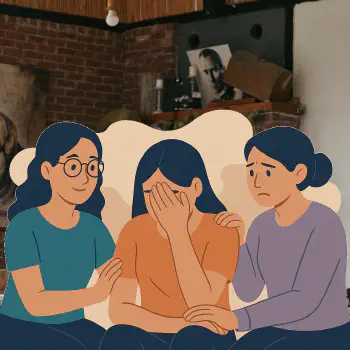As the stigma around talking about mental health reduces across the world, it’s created the need to have more nuanced conversations around the way we seek support for our mental health.
For example, one of the core beliefs and values of TheMindClan.com, is that the way in which you choose a doctor for your physical health, wouldn’t be the same way you choose a therapist or support group for your mental health.
In finding a mental health support, you’re looking to understand the person behind the professional, their identity, background, story, and other information which you just don’t necessarily account for when you’re looking for a doctor. You’re looking to vibe with the professional or community on a personal level, which becomes the foundation of your therapeutic relationship with them.
This motivated us to work towards not just making the vast range of mental health support providers accessible to you and is now motivating us to let you know some of the nuances we’ve picked up when it comes to using the ‘right’ language around mental health support.
Why is it important to use sensitive language when speaking about mental health?
Unknowingly, when we talk about mental health we forget that the words that we use could be more harmful than swords, when talking for people with lived experiences. When we use mental health as an adjective , we do not give the person who lives with the condition the respect they need.
What are some examples of sensitive language?
Don’t say ‘Committed Suicide’, say ‘Die By Suicide’ instead.
The word ‘commit’ makes suicide sound like a crime, when in most countries (including India) suicide has been decriminalized.
Don’t say ‘Cure’, instead say ‘Cope’.
There’s usually no ‘cure’ for a mental health concern. Sometimes it just won’t show up in your day to day as much as it did. Your mental health isn’t something that you should be cured of. Instead, it’s something you learn how to cope with.
Don’t say “Mental Health Illness”, instead say “Mental Health Condition”.
You may have picked this one up while reading this article too. The word “illness” implies that the person isn’t healthy, which is not the case. You may also additionally use the term “mental health concern” when speaking about someone who doesn’t have a mental health condition but still experiences distress.
Don’t say “Be Positive”, instead say “Be Hopeful”.
For most folks, positivity is an inaccessible emotion due to the extent of distress they experience. The role of mental health care is not to make them more optimistic. It’s to help them be more hopeful by walking them through support.
Don’t say “Suffer From”, instead say “Experience” or “Cope With”.
Never use the word ‘suffer’ to explain someone’s mental health experience. Eg: Instead of saying ‘They suffer from anxiety’, say ‘They experience anxiety’.
Don’t say “Get Treatment”, instead say “Get Support”.
Treatment assumes that psychiatry is the only way to experience mental health support. Instead, the mental health space is filled with Therapists, Support Groups, Helplines and so many other mental health care workers, that using the word “support” allows them to know that they can choose many ways of caring for their mental health.
How can you keep a tab of inclusive and accessible language?
As the nuance around mental health care becomes more inclusive and accessible, here are a few resources for you to keep yourself updated about sensitive language in mental health.
What To Say Series By Mithra Trust:
The what to say series by Mithra Trust supports you in having difficult conversations. It helps you be empathetic and supportive by giving you statements of what to say and what not to say , which is equally important.
Feminism In India:
Resources by us, TheMindClan.com:
- Asking for a friend: A series of explanation nuggets by TheMindClan.com, where we hope to help you learn and unlearn terms related to mental health that you should know about, but have been afraid to ask.



















